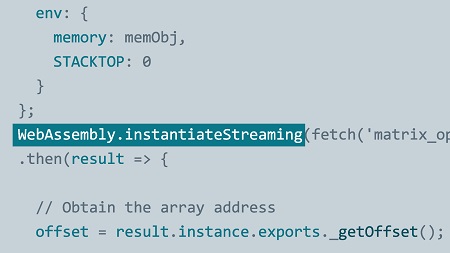
English | MP4 | AVC 1280×720 | AAC 48KHz 2ch | 1h 45m | 213 MB
Accelerate web applications with native code using WebAssembly. WebAssembly is a new, revolutionary technology that allows developers to program webpages using popular high-level languages like C, C++, Rust, and Python. Code is then compiled to WebAssembly bytecode and implemented by the JavaScript engine built into all web browsers. You gain flexibility and functionality without sacrificing performance. This course focuses on the practical uses of the technology: converting C and C++ code to WebAssembly and executing WebAssembly in JavaScript. Programmer and engineer Matt Scarpino demonstrates the power of the WebAssembly, implementing quick sort and matrix multiplication algorithms. He also reviews advanced features, such as debugging and the WebAssembly text format. By the end of the course, you’ll understand the massive potential WebAssembly represents and be ready to implement it in your next web project.
Topics include:
- Programming for WebAssembly with Enscripten
- Building projects with enmake
- Loading WebAssembly into JavaScript
- Calling JavaScript in WebAssembly
- Practical algorithms for WebAssembly apps
- Analyzing WebAssembly apps
Table of Contents
Introduction
1 Accelerate your web applications with WebAssembly
2 What you should know
3 Using the exercise files
WebAssembly and Emscripten
4 Overview of WebAssembly
5 Installing Emscripten
6 Installation walk-through
7 Compilation and execution
8 Simple WebAssembly example
9 Building projects with emmake
10 Emscripten makefile example
WebAssembly Development
11 Loading WebAssembly into JavaScript
12 Loading WebAssembly example
13 Calling JavaScript in WebAssembly
14 Calling JavaScript example
15 Memory objects
16 Memory object example
Practical Algorithms in WebAssembly
17 Introduction to quicksort
18 Implementing quicksort in WebAssembly
19 Introduction to matrix operations
20 Managing matrices in memory
21 Matrix operations example
Analyzing WebAssembly Applications
22 Analyzing debug information
23 The WebAssembly text format
24 Advanced WebAssembly text format
Conclusion
25 Next steps
Resolve the captcha to access the links!